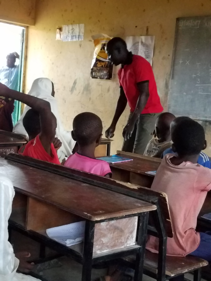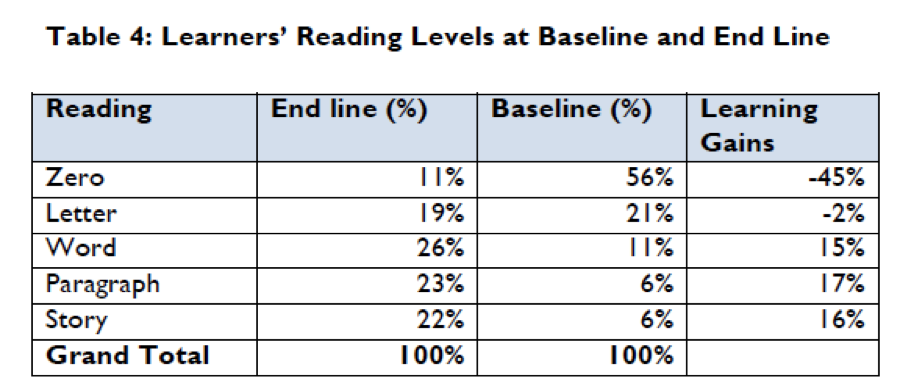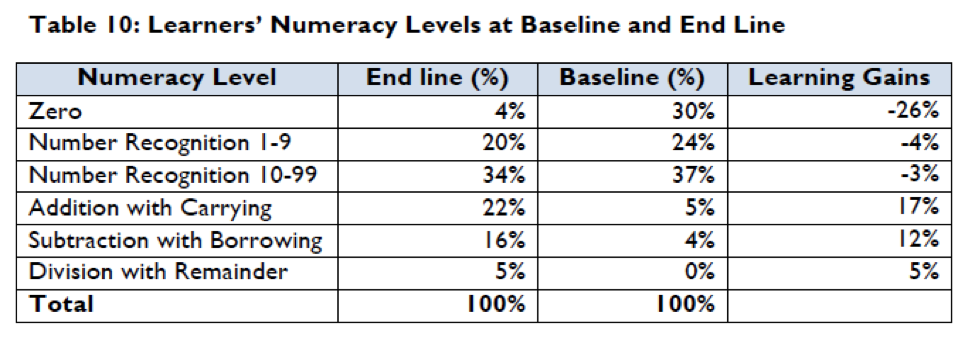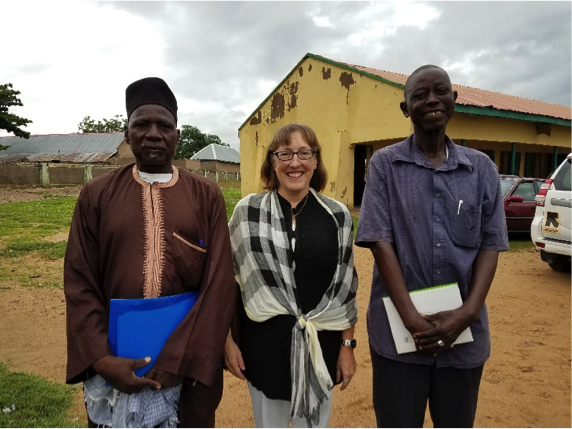FSU’s Learning Systems Institute aids Education Crisis Response Project in Northern Nigeria
The Northern Nigeria Education-in-Conflict Response Program (ECR) will draw to a close in October 2017. This project was funded by USAID and implemented by Creative Associates International, in partnership with the International Rescue Committee, Florida State University, and local organizations. The initiative began in 2014 to address the gaps in education that internally displaced children and youth face due the ongoing conflict in the Northeastern states in Nigeria.

delivers instructions to learners at the
Jambutu Non-Formal Learning Center in
Yola, Adamawa state, in Nigeria.
Credit: Helen
Boyle
Internally displaced people (IDP) have had to flee their homes due to insurgency, violence and environmental risks; schools have been burned down in some communities and have stopped operating. Thus, to address a potentially growing educational crisis, the ECR project goal was to provide technical assistance to the Nigerian state governments, by collaboratively designing and delivering instruction in basic literacy, numeracy and social and emotional learning to IDP children and youth. Working with communities with high numbers of IDPs, the project established Non-Formal Learning Centers (NFLC) in the states of Adamawa, Bauchi, Gombe, Yobe, and recently Borno. Communities participated in the establishment of the centers and assumed the day to day direction of the NFLCs. Lesson content was to include literacy, numeracy and social and emotional learning skills in an integrated fashion.
Experts from the Florida State University (FSU)’s Learning Systems Institute, were invited to work with Creative Associates International and International Rescue Committee on the design of an early grade literacy scope and sequence and then a related set of early grade literacy (Hausa) scripted lessons to guide NFLC facilitators. FSU also worked with the ECR numeracy team to provide technical feedback and quality control. The lessons were designed to align with the non-formal curriculum used by Nigeria’s State Agencies for Mass Education. In particular, FSU’s team drafted over one hundred scripted lessons, incorporating social and emotional learning messages, for Hausa and reviewed XX lessons for numeracy. The Hausa lessons incorporated existing Hausa language stories for the early grades, developed by a previous project. International Rescue Committee took part in the Social Emotional Learning. The program established learning centers complete with trained staff to teach the three subjects. The goal of these centers is to help the children get back into formal education one day. Currently, the children come to the centers for a few hours, several days a week.
In the first year, 296 learning centers were set up and reached over 14,000 learners. In the second year, 408 learning centers reached over 25,000 children. Creative Associates International conducted baseline, ongoing, and end line assessments of the project. The results are promising. The following tables were taken from the USAID Report: “Education Crisis Response Year 2 End Line Assessment Year 2” from November 2016. See citation at the end of this article.

- 16 percentage point increase of learners at highest literacy levels, meaning 16% more learners read at the highest level at the end of year two.
- 45 percentage point decrease of learners at lowest levels, meaning 45% less learners read at a level zero at the end of year two.

- 26 percentage point decrease of learners at lowest levels, meaning 26% more learners could now recognize numbers and moved the numeracy level scale.

Helen Boyle of Florida State University’s Learning Systems Institute,
and Torchau Musa, Secretary Yola-North community coalition, during a
visit to the Jambutu non-formal learning center in Yola, Adamawa state.
Credit: Chima Onwe
Positive change from from baseline to end line was also seen in the various Social-Emotional Learning scales. Please see results from that in the aforementioned USAID report.
The implication of the results is that the lessons were quite successful. Given that they were developed rapidly, not under the best of circumstances, since the project had to work fast, this is impressive and promising for the future of education in Northeastern Nigeria. Moving forward, the FSU team suggests expanding the centers and working with older IDP in the future.
Article refers to: USAID Nigeria. (2016). Education Crisis Response Year 2 End Line Assessment Year 2. Washington, DC: Creative Associates International.
